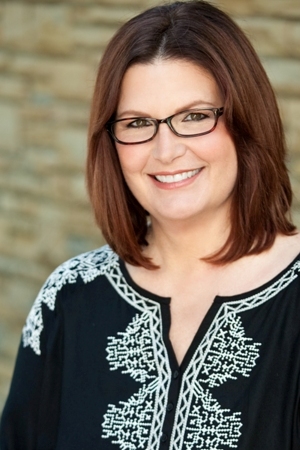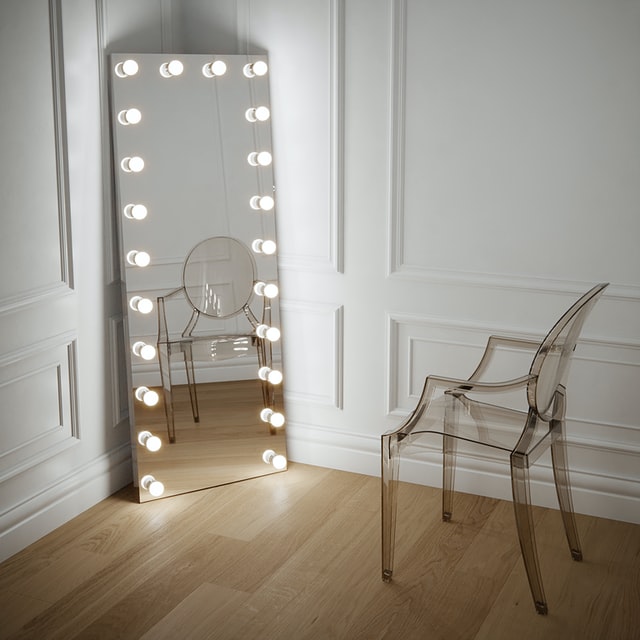My Fault’s Gift
I stormed down our hallway on the heels of my teenage daughter, Amelia*. She slammed her bedroom door, but I barged in to demand she get a grip on herself. She was sitting on the edge of her bed. Our eyes met. Her hatred took my breath away. “Get out,” she screamed. “I hate you. It’s all your fault I’m fat.”
“Babe,” I said, hesitating. My fingers clenched the doorknob. I moved toward her, thinking I might offer her a hug.
She sank to the floor, sobbing.
I raced to her side, and she collapsed into my lap.
“Why’s it so hard?”
She meant life.
Rubbing her back, all I could think was I am such a fuckup. It was my job to protect her, and I had failed. Should haves raced through my mind. I should have embraced rice cakes. I should have banned sugar and pretended to love exercise. I should have made a bigger deal out of the lie of perfection when we watched TV. I should have done more to save her from this pain, too familiar to me as an overweight kid and now woman.
I fought back tears of my own. “I don’t know why life’s so hard, sweetheart.” But I can sure relate.
My body had never been my friend. Not when I was eleven and my pediatrician put me on my first diet. Not when I got asked out by a boy for the first time on April Fools’ Day. Not when I needed a plus-size prom dress and, later, wedding gown. Down went the scale, then back up. Down and up. Weight Watchers. Diet pills. Overeater’s Anonymous. Hypnosis. Jenny Craig. Nutri-System. Lindora. Fen-Phen before it was banned due to the risk of heart valve damage. A stationary bike. Gym memberships. Cross-country ski machine. Jazzercise. Exercise tapes. Thousands of dollars—my parents’ and mine—and hundreds if not thousands of hours of my time spent in meetings, stepping onto and off of scales, weighing and measuring my food, and obsessing about the size of my body. Except for when I was pregnant, by the time Amelia was born I’d been wrestling with diets for two decades.
I stroked Amelia’s forehead as tears slid down her cheeks. What have I done? Had I not listened hard enough when the pediatrician announced to her four year old self that we needed to keep an eye on her weight? I tried. I stocked the house with fruits and veggies, made sure Amelia got plenty of exercise, and limited second helpings and sweets. “Enough with the cheese,” I said that one time, wrenching the extra slice from her tiny fingers. “No more ice cream,” I said another time, putting the container back in the freezer. No. No. No. But it wasn’t enough.
When Amelia was hungry, or wanted a special treat, what was I supposed to do? I didn’t want to deny her any more than I did myself, and remaining strict day after day was too hard. If she pleaded for mac and cheese again for lunch, I said yes. If she wanted a celebratory trip to Baskin Robbins, I said yes. “Yes!” Now I wondered if my yeses were really to my adult self and I’d just wanted company, an accomplice, a reason to acquiesce.
Had my own yo-yo diet ride and mixed messages utterly confused young her? “Stop eating as much” or “Yes, let’s eat.” I ran my hands over Amelia’s hair and thought, for the first time ever, that the answer was an undeniable yes.
My belly cushioned her head and I felt self-conscious about how it bulged under my shirt. I felt the spread of my thick thighs and the sag of my heavy breasts. I was the fat one, not Amelia. But she felt the same way about her body as I’d always felt about mine. Gross. Disgusting. Ugly. I heard words I’d said out loud, but never in front of Amelia, spew from her mouth towards the mirror. Had I embedded that shame and loathing directly in her DNA?
“Why does it have to be so hard?” she asked again, wiping her face on my jeans.
“I just don’t know,” I said again. I couldn’t fathom an adequate answer to her question.
My body. Hers. Their size and shape. How could bags of fluid, bone, and muscle cause this much pain?
Even with my determination to not repeat my parents’ mistake—the way they made the too-muchness of my body a topic of regular conversation, especially my mom—apparently I had. Those words “It’s all your fault” echoed in my mind. I’d felt the same way. The more Mom pointed out my relationship with food and what it was doing to my body, the more I ate. The harder I tried to stop eating, the better food tasted, and the stronger my cravings grew. Sometimes, when she looked at me, I could see the disappointment in her eyes. No way. I wouldn’t put Amelia through that.
I’d been mum on the subject; hadn’t I?
Finally, Amelia sat up. Mascara streaks smudged her cheeks. “I have to go to the bathroom.”
I watched her perfectly-sized body walk away. A couple of months ago, she started starving herself. She was getting thinner. And she was growing angrier every day, raging with outbursts. A photo on Amelia’s dresser caught my eye. In her soccer uniform, with her cheeky smile, she looked carefree, and I thought about what her pediatrician had said about it. “I’m worried, Amelia. You’re losing weight too fast. It’s not healthy.” Why didn’t I forbid that doctor from ever talking to Amelia about weight? The thought never entered my mind.
I remained on the floor in a stupor. Amelia’s words rang in my ears: It’s your fault I’m fat. I hate you. Pain and fear soured my tongue. She wasn’t seeing herself clearly.
Why hadn’t I gotten my shit together and kept it together? Besides her own, my body was the one Amelia knew most intimately. I wondered if the outline she saw when she looked in the mirror was mine. Would she ever be satisfied with her size or would she rather disappear?
I should have turned the TV off, thrown away my Weight Watchers food scale. My Weight Watchers measuring spoons, points trackers, pre-portioned snack foods, and cookbooks, too. What must Amelia have thought watching me endlessly weigh pieces of meat to four ounces and measure out half cups of starchy side dish? Heating up a boxed diet meal instead of partaking in the family dinner? I may not have insulted myself out loud, but she had seen me eat to soothe my emotions, frown at the size of my butt, and cut size labels out of my clothes. “Amelia, you’re perfect,” I’d repeated, but the sentiment, compared to my actions, paled to transparency.
I climbed off the floor and walked to Amelia’s bathroom door. She’d been in there for a while. “You okay? Need anything?”
“I’m fine,” she said from the other side.
I headed toward the kitchen. Someone had to make dinner even if no one felt like eating it. From the fridge, I grabbed lettuce, cucumbers, celery, tomatoes. Salad was a staple—without dressing, zero points in the Weight Watchers’ food tracking system.
I stood over the cutting board, calming myself with the familiar rhythm of peeling and chopping. I heard Amelia leave her bathroom. My chest ached knowing that she was in pain, knowing that she was right. I was responsible for this mess. Patterns I created around food and body image may have differed from ones I’d learned, but the end result was the same or even worse. I wasn’t sure how, but I was determined to fix this mess because that’s what a good mom does.
In the following months, Amelia’s health grew more dire. I fought against an eating disorder that was threatening to steal what I held most dear. I read books and researched mental illness. I begged Amelia to accept the help being offered by therapists and treatment centers and to do the work to get better, but she refused. Sitting across from my therapist I cried or yelled. “Why can’t anyone figure out how to make a fourteen year old want to eat? One person tells us to do x and the next says to do y. The third z. No one agrees on anything. I feel like I’m playing a craps game with my daughter’s life.”
To my litany of complaints my therapist nodded and said, “You know, Amelia wants to see you taking care of yourself.”
Bullshit. Every time she said it. Bullshit. Good mothers sacrifice for their kids. Period. It didn’t matter that I had abandoned my self-care. That I was in constant despair: gaining more weight, wearing the same sweats every day, drinking too much, sticking a clip in my unbrushed hair. I was busy leaving no stone unturned to find whatever would help Amelia.
“Your daughter wants to know you’re okay,” my therapist said again.
One day, I pounded my thigh with my first. “Then the system is backwards.”
“What do you mean?” she asked.
“The whole point, I guess, is that by taking care of myself I show Amelia how to take care of herself.” I paused. “Which is about way more than just food.” I leaned back, drained by the realization. Putting myself on my agenda was the best way to show my daughter how to do the same. I thought about fault and for the first time I saw it all clearly.
My fault, if it could be so named, was an inability to show Amelia what had never been shown to me: worth is inherent. My attempts to fix myself with pills and powders, scales and treadmills, recipes and self-flagellation were doomed to fail because I’d been missing the point. The state of my outside was a reflection of the state of my inside.
I needed to change my focus. Redirect my attention. Take responsibility. I had to accept what I could control— myself, and what I couldn’t control—Amelia. I would facilitate the help for her that I could, but I would finally take my therapist’s advice and figure out how to add myself to my to-do list.
Ten months after Amelia gifted me the words, “It’s your fault,” she started her freshman year of high school. I pulled the car to the curb and turned to her. “I’m so proud of you. Call me if you need anything.”
“Thanks, but I think I’ll be fine,” she said, smiling. She looked nervous and excited, just like the other kids. “I love you.”
“I love you, too, babe.”
Amelia climbed out and I watched her enter the fray. My eyes welled and my heart soared. It was hard to believe we’d come this far. I craned my neck to keep her in sight, and a palpable sensation of gratitude coursed through me. Over the months and with plenty of help, Amelia was getting healthier. I was too and it had nothing to do with numbers on a scale. I was learning about the power of presence and surrendering to reality. How meditating quieted my inner critic and practicing acceptance opened me to more peace and joy. My worth wasn’t located in my hips, thighs or butt. And I told Amelia that hers wasn’t either. “You’re more than the sum of your parts.”
Once in a while, she believed me because she could see that I was believing me, too.
Amelia disappeared around a corner. I breathed deep. My body was still big, and it supported me. My body was still big, and it achieved my desires. My body had created an exquisite daughter, who was my inspiration for healing, and I was falling in love with every inch of it. For the first time I thought, simply, “Thank you.” Thank you.




